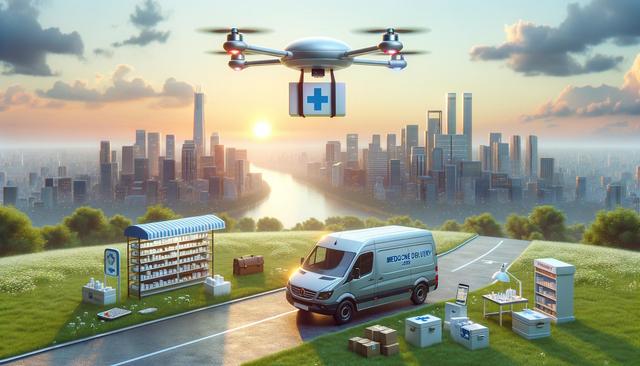Understanding the Role of Medicine Delivery Jobs
Medicine delivery jobs are becoming a vital part of the healthcare system, especially as more people seek convenience and safety in accessing their prescriptions. These roles involve transporting medications from pharmacies, hospitals, or distribution centers directly to patients’ homes. The function they serve is more than just logistical; it’s a bridge between professional healthcare services and patients who may be elderly, housebound, or managing chronic conditions. As healthcare becomes increasingly patient-centered, the demand for reliable and timely delivery of medications has grown significantly.
People working in medicine delivery are often responsible for ensuring the secure and accurate transportation of sensitive pharmaceuticals. This requires a strong sense of responsibility and attention to detail, as even minor errors can lead to serious consequences. While no medical license is required, those in this field must understand the importance of confidentiality and the proper handling of medical supplies. The role is part customer service, part logistics, and fully essential to the evolving healthcare delivery model.
Essential Skills and Requirements
Medicine delivery jobs call for a specific set of skills and qualifications, many of which revolve around reliability and interaction. Employers typically look for candidates who are:
- Punctual and dependable
- Familiar with local geography or GPS systems
- Comfortable handling sensitive or temperature-controlled items
- Capable of maintaining patient confidentiality
In addition to these soft skills, certain logistical requirements are usually expected. For instance, most positions require a valid driver’s license and a clean driving record. For those using their own vehicles, proof of insurance and a reliable mode of transportation are a must. Some delivery roles may involve use of company vehicles, and training is often provided to ensure compliance with safety standards. Background checks and drug screenings are also common, reflecting the trust placed in delivery personnel to handle healthcare-related materials responsibly.
Technological Integration in Delivery Services
Technology plays a growing role in medicine delivery jobs. From mobile apps that manage delivery routes to digital systems that track inventory and confirm drop-offs, tech tools help streamline the process and reduce errors. Delivery personnel often use handheld scanners, GPS systems, and customer communication platforms to keep everything running smoothly. These tools not only enhance efficiency but also contribute to transparency and patient trust.
Some systems also allow real-time tracking, enabling patients to see when their medication will arrive—a major comfort to those with urgent needs. Additionally, digital signatures and confirmation photos are becoming standard, helping to ensure that deliveries are accurate and secure. As healthcare continues to modernize, medicine delivery professionals are expected to stay current with these technological trends, often receiving training as part of their onboarding process.
Work Environment and Job Flexibility
One of the appealing aspects of medicine delivery jobs is the flexibility often associated with the role. Many positions offer part-time, full-time, or even gig-based opportunities, allowing individuals to choose schedules that fit their lifestyle. This makes it a viable option for students, retirees, or those looking for supplementary income. Some companies operate on a 24/7 basis to accommodate emergency prescriptions, offering a wide range of shifts including evenings and weekends.
The work environment varies depending on the employer. Some drivers operate independently and make deliveries across wide geographic areas, while others work as part of a team within a specific neighborhood or city. In both cases, the job typically involves:
- Frequent driving and navigation
- Interaction with pharmacy staff and patients
- Handling of paperwork or digital records
- Compliance with health and safety protocols
Weather conditions, traffic, and unforeseen delays can add to the complexity of the job, but many find the work rewarding due to its direct impact on patient well-being.
Opportunities for Growth and Advancement
While entry-level medicine delivery jobs may not require extensive experience, they can serve as a stepping stone to other roles within the healthcare or logistics sector. For individuals interested in career advancement, there are pathways into supervisory, administrative, or logistics coordination roles. Gaining experience in this field can also provide valuable insights into pharmaceutical operations, healthcare regulations, and patient care practices.
Some delivery personnel choose to further their careers by pursuing certifications or training in healthcare support services. Others might transition into roles within pharmacy operations, healthcare customer service, or supply chain management. Companies that value internal promotion often offer continued education or on-the-job training to help employees grow. This makes medicine delivery a practical entry point for those exploring long-term careers in healthcare support or logistics.
Conclusion: A Role That Delivers More Than Medicine
Medicine delivery jobs offer more than just a paycheck—they provide a meaningful way to contribute to community health and patient care. With the growing demand for home-based services, these roles are increasingly recognized as essential within the healthcare system. Whether you’re seeking flexibility, entry into the healthcare field, or an opportunity to make a tangible difference, medicine delivery can be a compelling option. As technology continues to reshape logistics and patient expectations evolve, this profession offers a dynamic and impactful path for those ready to step behind the wheel.




Leave a Reply